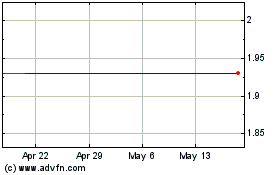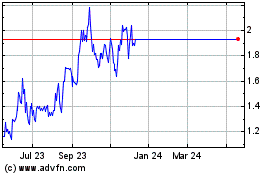Consolidated Uranium Inc. (“CUR” or the “Company”) (TSXV:
CUR) (OTCQB: CURUF) is pleased to announce that its has
closed the previously announced acquisition (the
“
Acquisition”) of a 100% undivided interest in the
Milo Uranium, Copper, Gold, Rare Earth Project
(“
Milo” or the “
Project”)
pursuant to the definitive sale and purchase agreement (the
“
Agreement”) dated November 10, 2021 between CUR
and Isa Brightlands Pty Ltd (the “
Vendor”), a
wholly owned subsidiary of GBM Resources (“
GBM”)
(ASX: GBZ). The Project consists of Exploration Permit – Minerals
(EPM) 14416, which includes 20 sub blocks or approximately 34
square kilometres located within The Mt Isa Inlier, approximately
40 kilometres west of Cloncurry in Northwestern Queensland,
Australia.
The Company is also pleased to advise that it
has been granted three contiguous EPMs located approximately 65 km
north of the town of Mount Isa in Queensland Australia, by the
Department of Natural Resources, Mines and Energy (Figure 1). This
new project called Gidyea Creek, covers an area of 785 kilometres2
and is located immediately adjacent to Paladin Energy Ltd.’s
Valhalla Project, which ranks as the largest uranium deposit in the
state.
Philip Williams, CEO commented, “Australia
remains an important jurisdiction for CUR, and we are pleased to
have closed the Milo Acquisition and established a foothold in the
Mt Isa region with the granting of the Gidyea Creek project
tenements. Increasingly, end users of uranium and investors are
recognizing the importance of projects domiciled in geopolitically
stable and mining friendly jurisdictions. The CUR global portfolio
was constructed with this in mind, with the bulk of our projects
located in Australia, Canada and the U.S. and we will look to
continue to add projects in these and other top tier jurisdictions.
Like many of our other projects, we believe that both Milo and
Gidyea Creek boast strong exploration potential which we intend to
pursue in short order. Our team is busy reviewing historic data
from these and our other Australian projects and we look forward to
providing more details on planned work programs in the coming
months.”
In connection with closing of the Acquisition,
CUR issued to GBM 750,000 common shares of the Company
(“Common Shares”), at a deemed price of $2.85 per
share which is based on the seven-day volume-weight average price
of the CUR Shares on the TSX Venture Exchange
(“TSXV”) up to the date immediately prior to
signing of the Agreement. In addition, CUR has assumed GBM’s
obligations pursuant an existing 2% NSR royalty on the value of
gold or other mineral derived from ore produced from the Project
payable to Newcrest Mining Limited
The Common Shares issued in connection with the
Acquisition are subject to final approval of the TSXV and subject a
statutory hold period under Canadian securities legislation ending
on August 21, 2022.
The Milo Uranium, Copper, Gold, Rare
Earth Project
The Milo deposit is a large IOCG breccia style
system where base and precious metal mineralization occurs as
moderate to steeply north-east dipping, sulphide rich breccia zones
which are enclosed by a zone of TREEYO-P2O5 enrichment forming a
halo to the base metal mineralization. Drilling by GBM from 2010 to
2012 totalled 32 drillholes with each phase of drilling extending
the mineralization to the north and south. The drilling has
delineated continuous Uranium, Cu and REE mineralization over a
strike length of 1 kilometre and up to 200 metres wide. The 2012
drilling program intersected some high-grade Cu mineralization
including 2 metres @ 6.19% Cu at 163 m downhole in MIL015, one of
the most southerly drilled holes.
Exploration potential at Milo is considered to
be good. Much of the previous work at Milo, including the bulk of
drilling, has been directed at the Milo Gossan. A similar gossan
occurs immediately to the west (Milo Western Gossan) and is over 1
kilometre long. It has a similar Radiometric signature to Milo. In
addition, a further large untested radiometric anomaly occurs
approximately 1 kilometre to the North (Milo North) which has the
largest radiometric anomaly on the tenement. Previous work has
focused on the rare earth potential of the project rather than the
Uranium potential.
Mining One Consultants (“Mining One”), an
independent consulting company, prepared a technical report on the
Project in accordance with the disclosure standards of JORC, 2004
entitled “Milo Project Scoping Study” dated March 2013.
Geomodelling Ltd. was contracted by GBM to generate a block model
resource estimate for the deposit for inclusion in the Mining One
report., which was detailed in a CUR news release dated November
10, 2021. This mineral resource estimate is considered to be a
“historical estimate” for CUR as defined under National Instrument
43-101 – Standards of Disclosure for Mineral
Projects (“NI 43-101”) and is not considered by the Company to
be current and the Company is not treating it as such. A Qualified
Person has not done sufficient work to classify the historical
estimate as current mineral resources. CUR would need to review and
verify the previous drill hole data and conduct an exploration
program, including twinning of historical drill holes in order to
verify the historical estimate as a current mineral resource.
The Gidyea Creek Project
The Gidyea Creek Project tenure is located
within the highly prospective Leichhardt River Fault Trough (LRFT),
part of the Western Succession of the Mount Isa Basin. The Western
Succession has a long history of Uranium exploration (over 50
years) and is associated with over 100 recorded uranium occurrences
hosted within the Paleoproterozoic metasediments and mafic volcanic
rocks (Polito et al., 2007) that belong to the Eastern Creek
Volcanics (ECV). The majority of known uranium occurrences in the
ECV occur to the east by the Gorge Creek Fault and the Quilalar
Fault Zone, to the north by the Crystal Creek Fault, to the west by
the eastern margin of the Sybella Granite and the Twenty-nine Mile
Fault and to the south by a zone coincident with the Mount Isa
township (Polito et al, 2007). The mineral occurrences are observed
as ironstone gossans some associated with small historic uranium
workings, generally co-incident with large radiometric, magnetic
and geochemical anomalies. The most significant of these
occurrences is the Valhalla group of deposits (Valhalla, Odin,
Skal) which occur just to the south of the Gidyea Creek Tenement
boundary.
Figure 1: Gidyea Creek Project Location Map is
available
at: https://www.globenewswire.com/NewsRoom/AttachmentNg/39599457-6245-4237-873e-2f0b88cb7d00
The Valhalla deposit is an epigenetic,
hydrothermal, structurally controlled and albitite-hosted deposit
of uranium. It is located within a NNW-striking sequence of
intercalated metabasalt, laminated meta-shales and meta-siltstone
units of the Eastern Creek Volcanics, which form a thick rift/sag
sequence within the Leichhardt River Domain of the Mount Isa
western succession (Cover Sequence 2) thought to have occurred
between 1740 and 1680 Ma within the latest Paleoproterozoic. The
Valhalla and Skal mineralisation are hosted by
hematite-magnetite–carbonate breccias associated with a zone of
intense mylonitic/cataclastic shearing and hydraulic
brecciation.
The presence of significant zones of uranium and
copper mineralisation, the proximity to the regional Mt Isa Fault
zone, the proximity to granite intrusives and the mineralogy of the
known deposits have been taken to imply that the mineralisation has
an IOCG association (Hitzman and Valenta, 2005), however others
hypothesize that the uranium deposits are metamorphosed equivalents
of Proterozoic unconformity-type uranium deposits (Gregory et al,
2005).
The primary exploration target at Gidyea Creek
is potential uranium occurrences with the ECV sequences which
extend through the Gidyea Creek project tenure. Initial exploration
activity will consist of data integration and review, in
conjunction with development and refinement of the mineralization
models to define first-order targets within the project tenure.
Technical Disclosure and Qualified
Person
The scientific and technical information
contained in this news release was reviewed and approved by Peter
Mullens (FAusIMM), CUR’s VP Business Development, who is a
“Qualified Person” (as defined in NI 43-101).
About Consolidated Uranium
Consolidated Uranium Inc. (TSXV: CUR) (OTCQB:
CURUF) was created in early 2020 to capitalize on an anticipated
uranium market resurgence using the proven model of diversified
project consolidation. To date, the Company has acquired or has the
right to acquire uranium projects in Australia, Canada, Argentina,
and the United States each with significant past expenditures and
attractive characteristics for development. Most recently, the
Company completed a transformational strategic acquisition and
alliance with Energy Fuels Inc., a leading U.S.-based uranium
mining company, and acquired a portfolio of permitted,
past-producing conventional uranium and vanadium mines in Utah and
Colorado. These mines are currently on stand-by, ready for rapid
restart as market conditions permit, positioning CUR as a near-term
uranium producer.For More Information, Please
Contact
Philip
WilliamsPresident and
CEOpwilliams@consolidateduranium.com
Mars Investor Relations+1 647
557 6640cur@marsinvestorrelations.com
Twitter:
@ConsolidatedUrwww.consolidateduranium.com
Neither the TSXV nor its Regulations Services
Provider (as that term is defined in policies of the TSXV) accepts
responsibility for the adequacy or accuracy of this release.
Cautionary Statement Regarding
“Forward-Looking” Information
This news release contains "forward-looking
information" within the meaning of applicable Canadian securities
legislation. “Forward-looking information” includes, but is not
limited to, statements with respect to activities, events or
developments that the Company expects or anticipates will or may
occur in the future including, but not limited to, the Company’s
ongoing business plan, exploration and work programs. Generally,
but not always, forward-looking information and statements can be
identified by the use of words such as “plans”, “expects”, “is
expected”, “budget”, “scheduled”, “estimates”, “forecasts”,
“intends”, “anticipates”, or “believes” or the negative connotation
thereof or variations of such words and phrases or state that
certain actions, events or results “may”, “could”, “would”, “might”
or “will be taken”, “occur” or “be achieved” or the negative
connotation thereof. Such forward-looking information and
statements are based on numerous assumptions, including that
general business and economic conditions will not change in a
material adverse manner, that financing will be available if and
when needed and on reasonable terms, and that third party
contractors, equipment and supplies and governmental and other
approvals required to conduct the Company’s planned exploration
activities will be available on reasonable terms and in a timely
manner. Although the assumptions made by the Company in providing
forward-looking information or making forward-looking statements
are considered reasonable by management at the time, there can be
no assurance that such assumptions will prove to be accurate.
Forward-looking information and statements also
involve known and unknown risks and uncertainties and other
factors, which may cause actual events or results in future periods
to differ materially from any projections of future events or
results expressed or implied by such forward-looking information or
statements, including, among others: negative operating cash flow
and dependence on third party financing, uncertainty of additional
financing, no known mineral reserves or resources, reliance on key
management and other personnel, potential downturns in economic
conditions, actual results of exploration activities being
different than anticipated, changes in exploration programs based
upon results, and risks generally associated with the mineral
exploration industry, environmental risks, changes in laws and
regulations, community relations and delays in obtaining
governmental or other approvals and the risk factors with respect
to Consolidated Uranium set out in CUR’s annual information form in
respect of the year ended December 31, 2020 filed with the Canadian
securities regulators and available under CUR’s profile on SEDAR at
www.sedar.com.
Although the Company has attempted to identify
important factors that could cause actual results to differ
materially from those contained in the forward-looking information
or implied by forward-looking information, there may be other
factors that cause results not to be as anticipated, estimated or
intended. There can be no assurance that forward-looking
information and statements will prove to be accurate, as actual
results and future events could differ materially from those
anticipated, estimated or intended. Accordingly, readers should not
place undue reliance on forward-looking statements or information.
The Company undertakes no obligation to update or reissue
forward-looking information as a result of new information or
events except as required by applicable securities laws.
Consolidated Uranium (TSXV:CUR)
Historical Stock Chart
From Oct 2024 to Nov 2024

Consolidated Uranium (TSXV:CUR)
Historical Stock Chart
From Nov 2023 to Nov 2024


